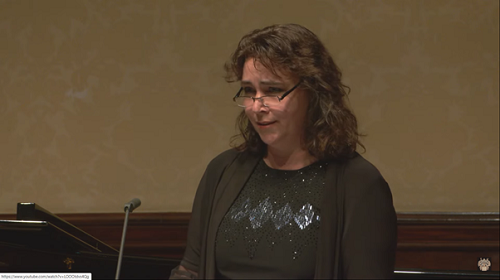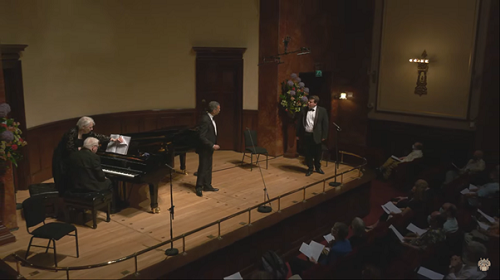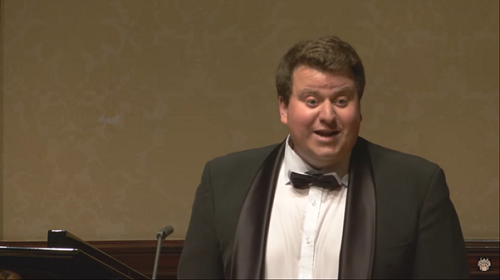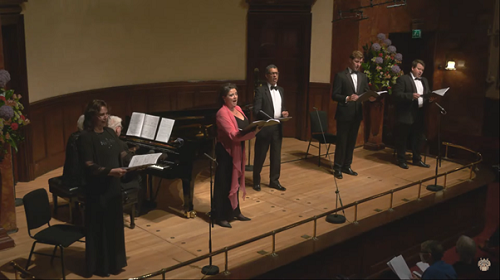A programme entitled Covid’s Metamorphoses might not seem a very auspicious way to celebrate a 120th anniversary, but, curated by pianist Graham Johnson, this special Song Gala placed themes of hope and renewal at its heart. In so doing, it reflected the spirit of Wigmore Hall during the past twelve months and the preceding 119 years.
Forced to close its doors on 16th March 2020, three months later Wigmore Hall became the first venue in the UK to resume live performance. During the past year the Hall has presented and broadcast over 200 concerts – performed by 400 artists and enjoyed by a cumulative worldwide audience of over 6 million – building in the process a substantial and valuable digital archive of live performances.
The 120th anniversary festival of 25 concerts has also involved the Hall’s first ever outdoor concert – a performance by 12 Ensemble, an unconducted string ensemble, in Portman Square Garden; a week-long Learning Festival on the theme of ‘Connectivity’ comprising concerts, an online art installation and events for families and people living with dementia; the appointment of nine new Associate Artists; the announcement of the 12 winners of Wigmore Hall’s Lockdown Commissions Scheme (chosen from over 700 applications); a new partnership with the Nigerian-Romanian pianist Rebeca Omordia who will lead a new African Concert Series reflecting the depth and diversity of African art music; and, the renaming of Wigmore Hall’s green room as the ‘Jessye Norman Green Room’ in memory of the soprano who opened more Wigmore Hall seasons than any other artist in the history of the Hall.

For Graham Johnson, Wigmore Hall must have seemed a ‘home from home’ during the past 46 years. His first steps onto the Hall’s stage came in 1975, and a year later he presented the first Songmakers’ Almanac which he founded along with singers Felicity Lott, Ann Murray, Anthony Rolfe Johnson and Richard Jackson, to explore neglected areas of piano-accompanied vocal music. Since then, his relationship with Wigmore Hall has seen him devising and accompanying countless concerts, including the Hall’s re-opening series in 1992 and centenary celebrations in 2001; presenting lectures; serving as Song Advisor and jury member for the Wigmore Hall Song Competition since its inception. In 2013 he was awarded the Wigmore Hall Medal ‘in recognition of his unstinting championing of Song and his extraordinary achievements on the concert platform and in the recording studio.’
To celebrate the Hall’s 120 years, Johnson had curated another meticulously prepared programme, moving from danger and lockdown to hope and recovery. Schubert’s ‘Der Tod und das Mädchen’ made for a sombre opening, soprano Sarah Fox inflecting anxiety and panic into the maiden’s breathless pleading and bass William Thomas, as unmoving and relentless as Mozart’s Commendatore, intoning Death’s intransigent response with menacing firmness and weight. There was a softening, though, with the image of the young girl sleeping soundly in Death’s arms, as Thomas slipped gently down to a warm, full low D. In the postlude, Johnson’s dactylic pulse seemed to breath more easily, sliding into the major key and closing with resignation but not despair. Haydn’s ‘Die Warnung’ (The warning) brought mezzo-soprano Christine Rice (deputising for the indisposed Alice Coote) and tenor Alessandro Fisher onto the platform. This part-song à 4 is one of the thirteen mehrstimmige Gesänge that Haydn composed in the manner of the English glee club catches that he had heard during his visits to London in the early 1790s. Here, the energy of the counterpoint was enhanced by excellent ensemble in the homophonic interjections and effective dynamic contrasts.

Schumann’s ‘Zwielicht’ (Twilight, from Liederkreis Op.39) was beautifully sung by Rice, whose hushed counsel swelled dramatically to warn against trusting the deceitful friend whose smiles belie treacherous intent, the meaning deepened by Johnson’s sensitive tracing of the vocal line. No one could ignore the final admonition, “Hüte dich, sei wach und munter!” (be way, watchful, on your guard!), so urgent was its delivery, low and intense, so direct and intent Rice’s stare. There was little consolation in the following ‘Nächtens’, one of Brahms’ Op.112 vocal quartets. Eerie and tense throughout, it darkened still further with Johnson’s ominous low postlude, and the latter was an apt preface for the concluding item in the sequence of ‘Danger’: Aschenbach’s encounter, in Britten’s Death in Venice, with the English Clerk who tells him the truth about the Asiatic cholera which has infected the city. As Fox, Rice and Thomas rushed from the stage, Fisher turned to baritone Roderick Williams, “Young man, why do all these people hurry to leave?” Williams was characteristically eloquent as the bearer of the bad news, making every word tell as switched from the professional politeness of a travel bureau clerk to candour and then growing anger at the authorities who deny the danger – “the city has never been healthier, they say”. Williams’ fierce denunciation, “the authorities are not moved by scruples, or by international agreements. They fear for their pockets …”, seemed horribly pertinent.

There were a few strange shifts of mood during the sequence, and one occurred with the move from ‘Danger’ to ‘Lockdown’, as Williams’ stern declaration gave way to the delicate melodising of Irving Berlin’s ‘All Alone’ – written following the death of the composer’s mother – which was sung with stylish gentility by Fisher. The tenor was also the vain serenader of Brahms’ ‘Vergebliches Ständchen’, pleading earnestly then assertively ordering his sweetheart to open her door, to no avail. The clarity and crispness of Fox’s soprano confirmed her unyielding refusal and she sent him home with a feisty dismissal. Short extracts from Shakespeare’s Love’s Labour’s Lost and Coriolanus, recited by Johnson, framed Samuel Barber’s ‘The Desire for Hermitage’ and Reynaldo Hahn’s ‘D’une prison’. Fox captured the intimacy and intensity of the pilgrim’s solace in solitude, shaping the phrases with wonderful tenderness, while in the piano’s ecstatic interlude Johnson seem to express the hermit’s transfiguring rapture. Thomas evoked the serenity of Hahn’s setting of Verlaine, the tranquillity tinged only once by sadness, when the poet-speaker berates himself for wasting his youth with endless weeping.
‘I know not whether Laws be right,/ Or whether Laws be wrong;/ All that we know who lie in gaol/ Is that the wall is strong;/ And that each day is like a year,/ A year whose days are long.’ Johnson and Thomas shared the words of Oscar Wilde to preface a second setting of Verlaine’s poem, that by Gabriel Fauré. Here, Thomas was dignified but restrained in his envy of the freedom and simplicity of life beyond the prison’s walls, rising in anguished self-castigation, his wasted youth seeming embodied in the fading harmonies of the final bars. Rice closed this section of the concert with ‘Ich bin der Welt abhanden gekommen’ (I am lost to the world) from Mahler’s Rückert-Lieder, wonderfully balancing tension and resignation, an ambiguity emphasised by Johnson’s ever so slight delaying of the final note of resolution.

Schubert’s ‘Frühlingsglaube’ brought forth hope in the form of Fisher’s light, flexible vocal line and the piano’s rolling triplets. The colouring of the final declaration, “Nun muss sich Alles, Alles wenden”, did indeed persuade that ‘now all must change’. There was power and reverence from Fox in Hugo Wolf’s ‘Gebet’ (Prayer, from the Mörike-Lieder) while Thomas’s performance of Hanns Eisler’s ‘An die Hoffnung’ was vivid and detailed. ‘Someday waiting will end’, from Ivan Caryll’s wartime musical The Girl Behind the Gun was urbanely rendered by Rice, with Johnson closing the section with an infectiously extrovert postlude.

And, so, on to ‘Recovery’, which sprang into life with Mendelssohn’s breezy ‘Frühlingsglaube’, sung with freshness and dynamism by Fisher. Wolf’s ‘Der Genesene an die Hoffnung’ begins sombrely as the poet-speaker, who has recovered from his illness, remembers that the day ‘dawned deathly grey’ as he had forgotten Hope, to which he now gives praise. Rice and Johnson captured the tremulous sensuality of the song, its almost dangerous emotional intensity, the mezzo-soprano plummeting bravely down in the final image of a fleeting peace, enfolded like a child in Hope’s arms. Thomas returned to Eisler, staying seated for ‘Genesung’ (Healing), and singing with discerning expressiveness. Rice’s vibrant performance of Milton Ager’s ‘Song of the Dawn’ summoned a momentum and brightness which spilled into Poulenc’s ‘Bonne journée’ from Tel jour, telle nuit, sung by Fox.
Irene Kiesewetter (1811-1872), a talented young pianist, was the daughter of Raphael Georg Kiesewetter von Wiesenbrunn, a civil servant, musicologist and bass singer who had taken part in some performances of Schubert’s music. She had fallen ill and upon her recovery her father seems to have asked Schubert to write a ‘Kantate für Irene Kiesewetter’ to celebrate Irene’s return to good health. The forces chosen were unusual – male vocal quartet, mixed chorus and piano duet – and it was in a slightly arranged form, and with Linn Rothstein switching from page-turner to pianist, that Schubert’s Kantate brought proceedings at Wigmore Hall to a close with sunny optimism and joie de vivre.

The encore – Noel Coward’s ‘I’ll see you again’ – celebrated, Johnson wryly explained, the soon-to-resume pleasure of face-to-face singing lessons, Williams and Fox leading the vocal intimacies and then inviting the other singers into the musical fold.
Claire Seymour
Sarah Fox (soprano), Christine Rice (mezzo-soprano), Alessandro Fisher (tenor), William Thomas (bass), Roderick Williams (baritone), Graham Johnson (piano)
Danger: Schubert – ‘Der Tod und das Mädchen’, Haydn – ‘Die Warnung’, Schumann – ‘Zwielicht’, Brahms – ‘Nächtens’, Britten – ‘The Travel Bureau’ (Death in Venice)
Lockdown: Irving Berlin – ‘All Alone’, Brahms – ‘Vergebliches Ständchen’, Barber – ‘The Desire for Hermitage’, Hahn – ‘D’une prison’, Fauré – ‘Prison’, Mahler – ‘Ich bin der Welt abhanden gekommen’,
Hope:Schubert – ‘Frühlingsglaube’, Wolf – ‘Gebet’, Hanns Eisler – ‘An die Hoffnung’, Ivan Caryll –‘Someday waiting will end’
Recovery:Mendelssohn – ‘Frühlingsglaube’, Wolf – ‘Der Genesene an die Hoffnung’, Hanns Eisler –‘Genesung’, Milton Ager – ‘Song of the Dawn’, Poulenc – ‘Bonne journée, Schubert – Kantate für Irene Kiesewetter
Wigmore Hall, London (live stream); Tuesday 1st June 2021.